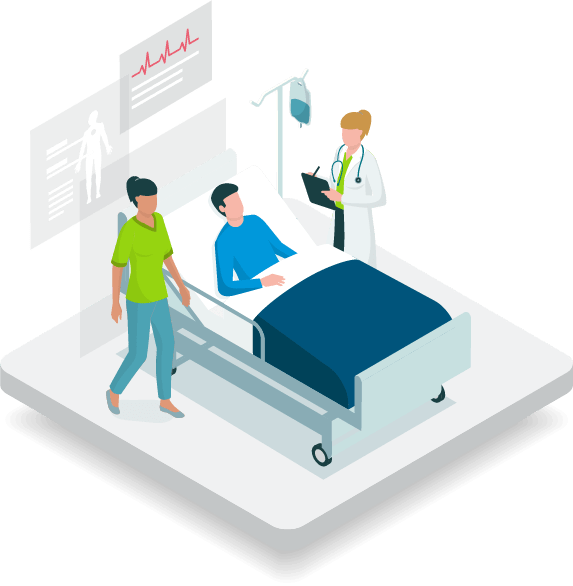One Solution. Enterprise-Wide Patient Activation Impact.
Decrease HRRP penalties
MPG begins by understanding each patient’s personal motivators and worries.
For example, one patient might be driven by fear of hospital bills (loss aversion) while another is motivated by the desire to stay independent at home. Our solution identifies these multi-dimensional motivators through assessments and conversation, then tailors messaging accordingly. This ensures that outreach isn’t one-size-fits-all but rather speaks to “why” each patient will take action.
Improve HCAHPS scores
Information and motivation alone aren’t enough if a patient is blocked by real-life obstacles.
MPG therefore gives equal weight to Practical Ease—removing barriers like transportation, scheduling confusion, or financial constraints. For example, when required, we use an activation oriented, Stressor Inventory process; our Activation Agents uncover non-clinical issues (lack of a ride to the clinic, difficulty affording medications, etc.) and mobilize solutions proactively. By clearing these hurdles, we make it as easy as possible for patients to follow their care plan.
Decrease care navigation expense
The MPG framework is built on 9 core behavioral techniques that drive action. Among others, these include methods like:
-
Motivational Interviewing to evoke patient goals and address ambivalence
-
Social Proof & Community Norms leveraging positive peer examples
-
Contrast & Framing highlighting the costs of inaction vs benefits of action
-
Choice Architecture & Micro-Commitments highlighting the costs of inaction vs benefits of action
Each technique is rooted in well-established psychology, and together they cover the full spectrum of persuasion and behavior change needed to move a patient from intention to adherence. Our Activation Agents are extensively trained in applying these MPG principles during patient interactions, ensuring every conversation or message is crafted to maximize its motivational impact.
Improve patient acquisition and retention
The MPG framework is operationalized by our AI-powered Enterprise GPS platform, which acts as the brain continuously monitoring and guiding patient journeys.
The system performs Continuous Motivational Profiling—learning which messages resonate best with each patient (e.g. emphasizing avoiding a negative outcome versus gaining a positive reward). It also uses data-driven segmentation to determine the right intensity of support for each patient (some may just need an automated text, others a phone call or in-home visit). As new data comes in (e.g. a patient misses a call or reports a new concern), the AI rules engine adjusts the plan in real time, selecting the next best action or escalating to a human Activation Agent when needed. This dynamic, closed-loop system means patients get timely, context-aware support instead of static workflows.
Increase clinical capacity
The activation psychology-based MPG approach is not just theoretical. It has been tested and refined in real healthcare environments.
Each of the nine building blocks has demonstrated success in practice, and our platform has over a decade of patient data informing its rules. For example, using Ease & Effort Minimization tactics like scheduling follow-up appointments for patients (instead of leaving it to them) has dramatically improved appointment adherence. Techniques like Relational Communication (empathetic listening and rapid response) have led to greater patient trust and willingness to share issues—allowing problems to be solved before they lead to readmissions. This evidence-based refinement process means the MPG framework reliably produces activation success across diverse patient populations.
Reduce patient leakage
The activation psychology-based MPG approach is not just theoretical. It has been tested and refined in real healthcare environments.
Each of the nine building blocks has demonstrated success in practice, and our platform has over a decade of patient data informing its rules. For example, using Ease & Effort Minimization tactics like scheduling follow-up appointments for patients (instead of leaving it to them) has dramatically improved appointment adherence. Techniques like Relational Communication (empathetic listening and rapid response) have led to greater patient trust and willingness to share issues—allowing problems to be solved before they lead to readmissions. This evidence-based refinement process means the MPG framework reliably produces activation success across diverse patient populations.
Streamline appointment setting
The activation psychology-based MPG approach is not just theoretical. It has been tested and refined in real healthcare environments.
Each of the nine building blocks has demonstrated success in practice, and our platform has over a decade of patient data informing its rules. For example, using Ease & Effort Minimization tactics like scheduling follow-up appointments for patients (instead of leaving it to them) has dramatically improved appointment adherence. Techniques like Relational Communication (empathetic listening and rapid response) have led to greater patient trust and willingness to share issues—allowing problems to be solved before they lead to readmissions. This evidence-based refinement process means the MPG framework reliably produces activation success across diverse patient populations.




